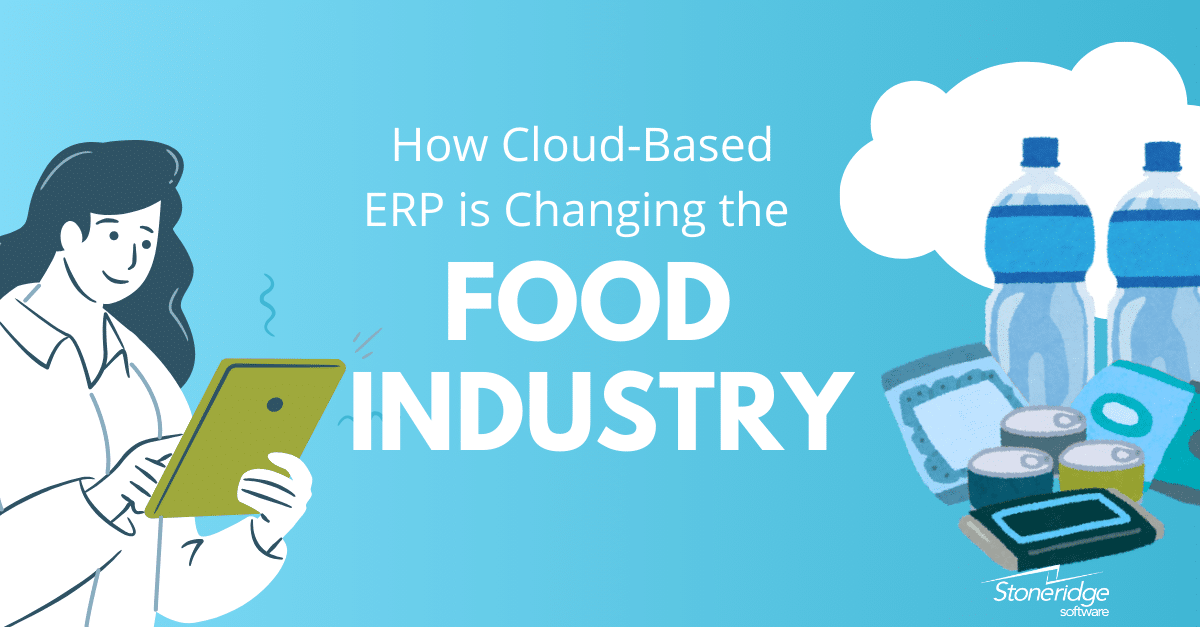How Cloud-Based ERP is Changing the Food Industry

Today’s food manufacturers need instant connection and real-time control of their operations to stay competitive, which requires an innovative set of tools. Fortunately, Microsoft Dynamics 365 ERP revolutionizes food and beverage software systems, enabling smarter decision-making, automation, and scalability like never before.
Why Cloud-Based ERP Is the Future of Food Manufacturing
Legacy food and beverage ERP systems—like Dynamics NAV or AX—served the food industry well for decades. But they were built for an earlier time: siloed departments, static data, and on-premises infrastructure. Modern food companies now demand rapid response that only cloud ERP can deliver.
Dynamics 365 ERP is backed by Microsoft innovation, purpose-built for the food industry, and preserves your operational data in the cloud in the event of a power outage or system failure. With D365, food manufacturers no longer have to choose between control and flexibility—they get both.
Key benefits of D365 cloud-based ERP include:
- Real-time data and reporting from any device
- Scalable infrastructure with automatic updates
- Lower IT overhead and security risks
- AI and automation built into workflows
- Simplified compliance and global traceability
Azure: Secure, Scalable Infrastructure Built for Growth
Microsoft Dynamics 365 runs natively on Azure, one of the most secure and scalable cloud platforms available. More importantly, Azure enables the integration of IoT devices, sensor-based monitoring, and predictive analytics, which are increasingly vital for managing real-time food processing data.
For food manufacturers, this means:
- High availability and disaster recovery
- Scalable compute power for peak production seasons
- Global compliance with certifications for food safety, data privacy, and export controls
- Edge computing capabilities for remote or disconnected environments (e.g., farms or field warehouses)
Dynamics 365 Business Central & Supply Chain Management for Food & Bev
Microsoft Dynamics 365 Business Central is best for small to mid-sized food companies looking for a unified system to manage finance, inventory, sales, and production. It’s fast to deploy, highly configurable, and connects easily to specialized food solutions.
On the other hand, Dynamics 365 Supply Chain Management is designed for larger food manufacturers. It provides deeper functionality around production planning, warehouse automation, demand forecasting, and supplier management—all with global scalability.
Both platforms support industry-specific needs like:
- Batch and lot traceability
- Expiration and shelf-life tracking
- Recipe and formula management
- Allergen controls and labeling
- Compliance documentation (e.g., FDA, GFSI, FSMA)
Copilot: AI-Driven Assistance Across Food Operations
One of the most exciting changes in cloud ERP is the integration of Microsoft Copilot, a generative AI assistant that helps food industry professionals work faster and smarter. Copilot isn’t just a chatbot—it’s a productivity engine embedded into your ERP environment, helping your team stay ahead of the curve and boosting user adoption through streamlined processes, automations, common language searches, and faster data search capabilities.
With Copilot in Dynamics 365, food companies can:
- Draft emails or reports automatically based on real-time ERP data (e.g., supplier delays or quality issues)
- Analyze ingredient cost fluctuations and forecast margins across product lines
- Summarize quality test results from lab systems and flag anomalies
- Generate production orders based on historical demand and upcoming shelf life expirations
- Respond to regulatory audits with instant access to traceability records and compliance docs.
Power Platform: No-Code Tools for Maximum Customization
Microsoft’s Power Platform (including Power BI, Power Automate, and Power Apps) empowers food companies to extend ERP functionality without costly development. With Power Platform, you can close process gaps and build food-specific tools—without touching the ERP’s core code or depending on external vendors.
Examples of food-specific use cases:
- Power BI dashboards to track yield loss by plant or shift
- Power Apps to digitize shop floor quality checks or sanitation logs
- Power Automate workflows to notify QA teams when test results exceed thresholds
- Embedded food and beverage industry software analytics to evaluate product profitability across sales regions and channels
Why Upgrade from Legacy ERP Systems to Dynamics 365?
If your business still runs a lagging and costly on-premises system, you’re not alone. However, these systems are approaching end-of-life, with rising support costs, limited cloud connectivity, and a growing risk of compliance failure.
Here’s what food companies gain by moving to D365 cloud ERP:
[table id=20 /]
Upgrading to Microsoft Dynamics 365 doesn’t mean starting from scratch—it means building on your legacy investments with a modern, connected platform.
Let Stoneridge Build the Digital Foundation for Your Future
Want to learn how to transform your food and beverage operations? Contact the experts at Stoneridge Software today to discuss your new Microsoft Dynamics 365 ERP system.
Under the terms of this license, you are authorized to share and redistribute the content across various mediums, subject to adherence to the specified conditions: you must provide proper attribution to Stoneridge as the original creator in a manner that does not imply their endorsement of your use, the material is to be utilized solely for non-commercial purposes, and alterations, modifications, or derivative works based on the original material are strictly prohibited.
Responsibility rests with the licensee to ensure that their use of the material does not violate any other rights.





